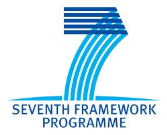Marie Curie Actions 2013
What are the Marie Curie Actions?
Marie Curie Actions promote research careers in Europe through funding schemes managed by the European Commission's Research Executive Agency. The 2007-2013 budget for the Marie Curie Actions amounts to €4.7 billion. Nearly half the funding (48%) supports PhD training for researchers, with 24% allocated to fellowships for researchers with more than four years of post-Masters' experience. The remainder supports industry-academia partnerships, career integration grants (for researchers returning to the EU), exchange schemes and specific support actions such as EU Researchers' Night.
Since 2007, more than 4 000 Marie Curie fellowship grants have been awarded to researchers working in 50 countries and representing more than 90 nationalities. Nearly €780 million has been allocated so far for individual fellowships, with an average grant of around €195 000. The grant normally covers two years' salary, a mobility allowance, research costs and overheads for the host institution. Around 37% of the beneficiaries are women. The leading destinations for Marie Curie fellows are the UK, followed by the United States, France, Germany and Switzerland. 75 other countries also host Marie Curie fellows.
How do the individual fellowships work?
Individual researchers submit proposals for funding in liaison with their planned host organisation. Independent experts select the researchers who will receive funding, based on their excellence, innovative research and training approach, as well as the support offered by the host organisation and the researcher's future career prospects.
Three types of individual fellowships are supported:
•Intra-European Fellowships (IEF) support researchers acquiring knowledge and new skills in another country within Europe.
•International Outgoing Fellowships (IOF) offer researchers the chance to acquire new knowledge in a high-level organisation outside Europe. As part of the grant agreement, the researchers have to return to Europe and share this knowledge.
•International Incoming Fellowships (IIF) enable researchers from outside Europe to be trained within a European institution.
What will happen to individual fellowships after 2014?
Individual fellowships will be maintained through the Marie Skłodowska-Curie Actions under Horizon 2020, with the option to spend a period in another type of organisation (e.g. a company). The details of the programme are still under discussion by Member States and the European Parliament. The European Commission expects to publish the first new call for individual fellowship applications by the end of 2013.
For more information
European Commission: Education and training

